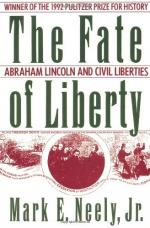
|
| Name: _________________________ | Period: ___________________ |
This quiz consists of 5 multiple choice and 5 short answer questions through Chapter 5.
Multiple Choice Questions
1. How does Dennis A. Mahony secure his release?
(a) His lawyer threatens to take the Union general to court.
(b) He swears an oath of loyalty to the Union.
(c) He bribes the warden.
(d) He writes and publishes articles about prision life.
2. Why is Chauncey Burr arrested in Chapter 3?
(a) For advising people to demand a peaceful settlement at the polls.
(b) For bringing illegal goods across picket lines.
(c) For breaking up a recruitment rally.
(d) For warning recruits they will go to hell.
3. Which famous case will refer to Samuel Perkins' arguments in 1966?
(a) Milligan.
(b) Writ.
(c) Perkins.
(d) Griffin.
4. How does Lincoln justify the suppression of such constitutional rights such as freedom of speech, freedom of the press, and habeas corpus?
(a) The country must temporarily give up freedom for safety.
(b) Spies could damage the commerce of the Union.
(c) Such rights are earned, not given.
(d) Rebels are using these rights to aid their rebellion.
5. Who is nicknamed the "Beast of New Orleans"?
(a) Benjamin F. Butler.
(b) Joseph Griffin.
(c) Abraham Lincoln.
(d) Samuel E. Perkins.
Short Answer Questions
1. Who is Edmund J. Ellis?
2. Who are the Copperheads?
3. In Chapter 2, to what charge do civilians who burn bridges typically plead guilty?
4. What is the verdict in Joseph Griffin's case?
5. What orders does President Lincoln give General Benjamin F. Butler and General-in-Chief Winfield Scott in Chapter 1?
|
This section contains 344 words (approx. 2 pages at 300 words per page) |

|




